What is Fair Trade Banana Paper?
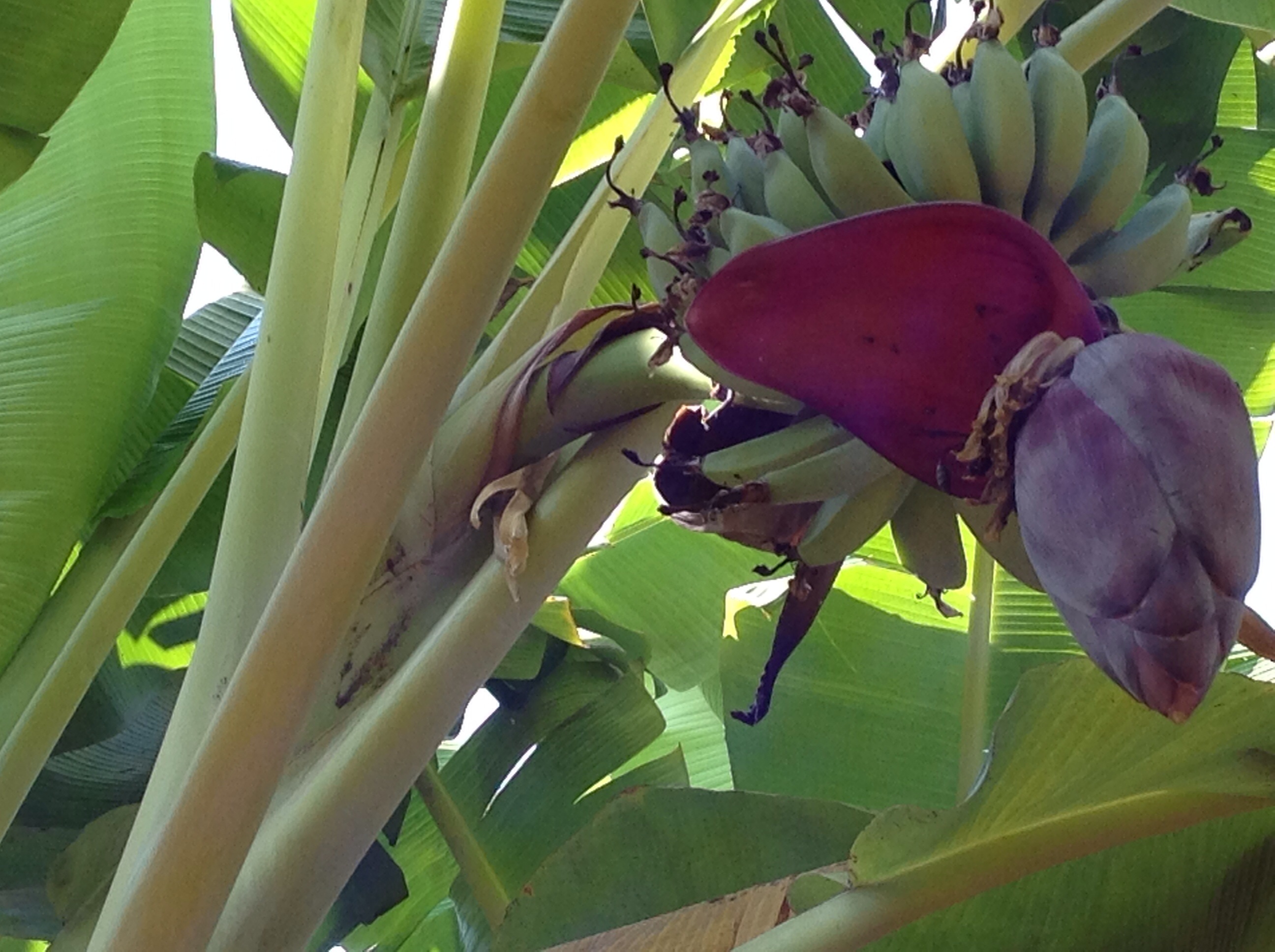
Bananas in Zambia
“Banana paper”. Don’t you think it’s fun and delicious just to hear the name? Bananas can only bear fruit once from one stem, so the stems are also cut off at harvest time. The cut stems will regenerate within one year, and new bananas will grow. Our banana paper is made by adding waste paper and FSC-certified pulp to the stem fibers that are usually discarded in organic banana fields, and at a washi paper factory in Japan. Banana paper made of this Fairtrade certified fiber is a social business based on a circular economy. And it is one of the solutions for deplasticization. * The following is a video of the organic banana fields and stems in Zambia that we are dealing with.
The product name is “One Planet Paper®︎”. Born from the collaboration of Japan washi technology and organic banana fiber from African villages, this paper is of high quality and creates value for the environment and society. One Planet Paper®︎ Council (a nationwide network of printing companies and paper product manufacturers) develops various banana paper products. In 2016, it became the first Japan paper to be certified as Fairtrade.
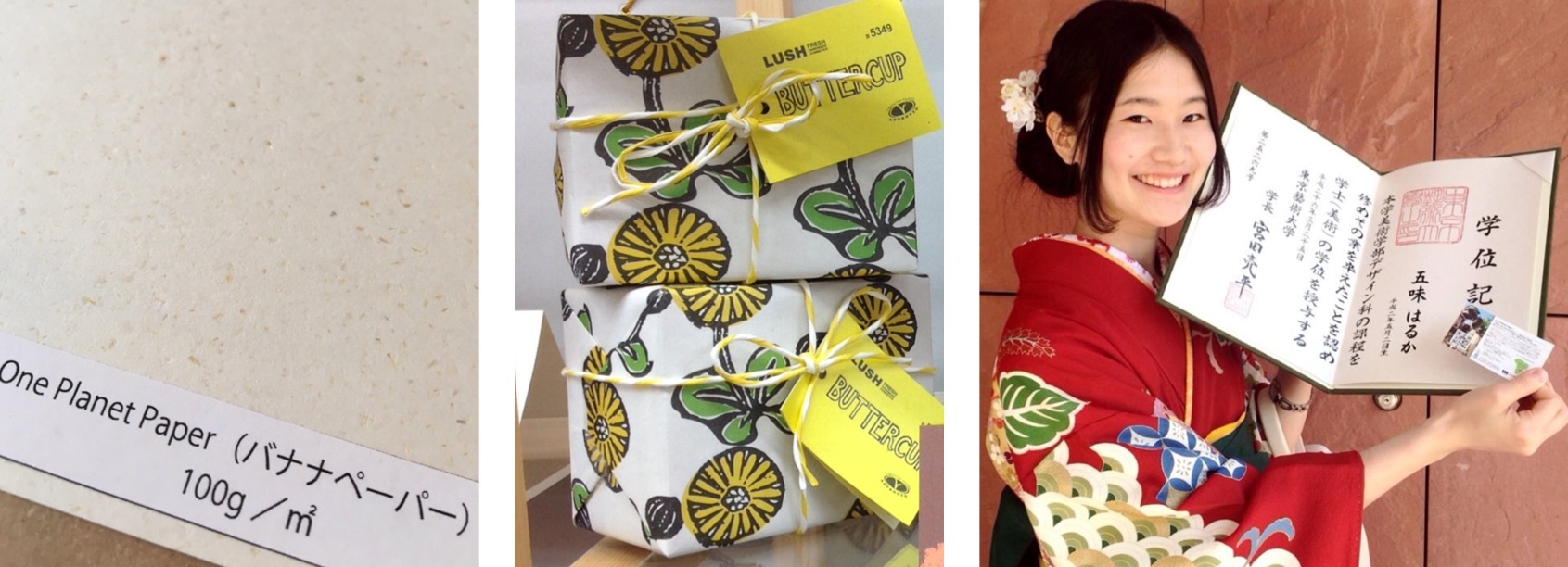
Banana paper products / From left: Banana paper (par cut paper / Yamasakura), banana paper wrapping paper (sustainable packaging / LUSH), banana paper certificate (Tokyo University of the Arts)
Where? Place
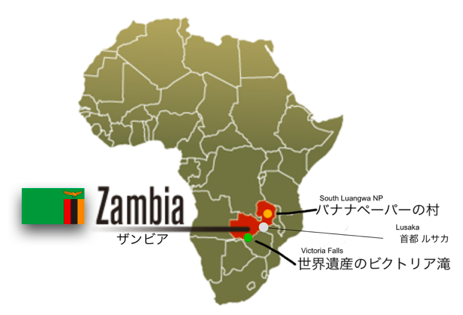 Zambia, a country in southern Africa, is famous for its World Heritage Site Victoria Falls. The banana paper factory is located in the Enfuwe region of eastern Zambia. This area is home to South Luangua National Park, one of Africa’s leading national parks, and is rich in nature where wild giraffes, elephants, lions, etc. live. At the end of 2017, South Luangwa National Park was selected as the world’s first sustainable national park by the United Nations.
Zambia, a country in southern Africa, is famous for its World Heritage Site Victoria Falls. The banana paper factory is located in the Enfuwe region of eastern Zambia. This area is home to South Luangua National Park, one of Africa’s leading national parks, and is rich in nature where wild giraffes, elephants, lions, etc. live. At the end of 2017, South Luangwa National Park was selected as the world’s first sustainable national park by the United Nations.

Beautiful giraffes seen up close! (Photo taken with smartphone)
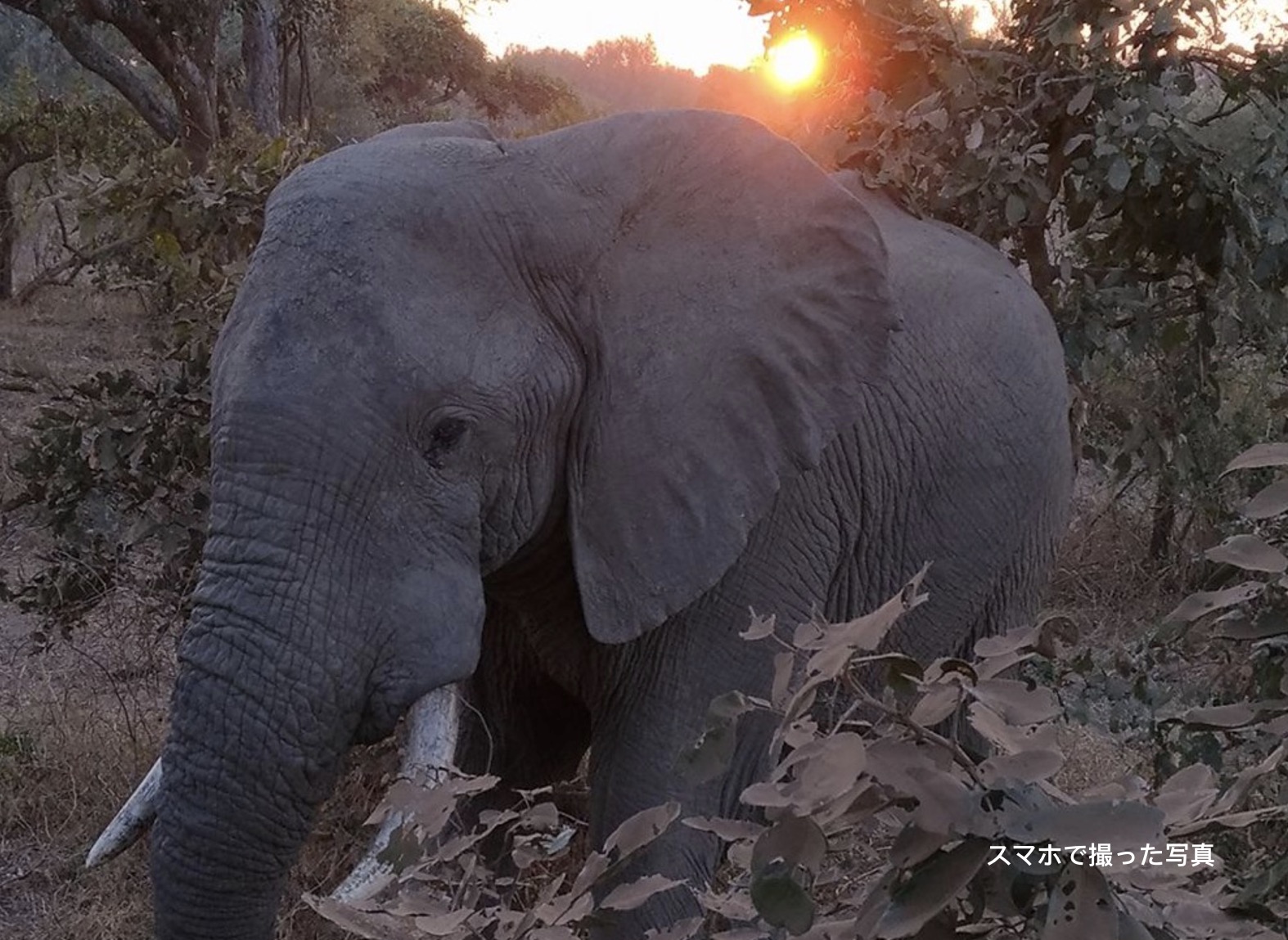
Elephants seen up close!
Background Background of the oneplanet paper®
In 2011, we started a banana paper business with poor women in a village in Zambia, a country in southern Africa where wild zebras, giraffes, and elephants roam freely. Zambia’s Enfuwe region is home to a world of amazing nature and wildlife. On the other hand, poverty in villages is serious, and poaching and illegal deforestation due to poverty are occurring. Since 2007, I have been supporting the education of village people and providing vocational skills training, but when I was looking for a business that would create employment more directly, I learned that paper can be made from banana fiber.
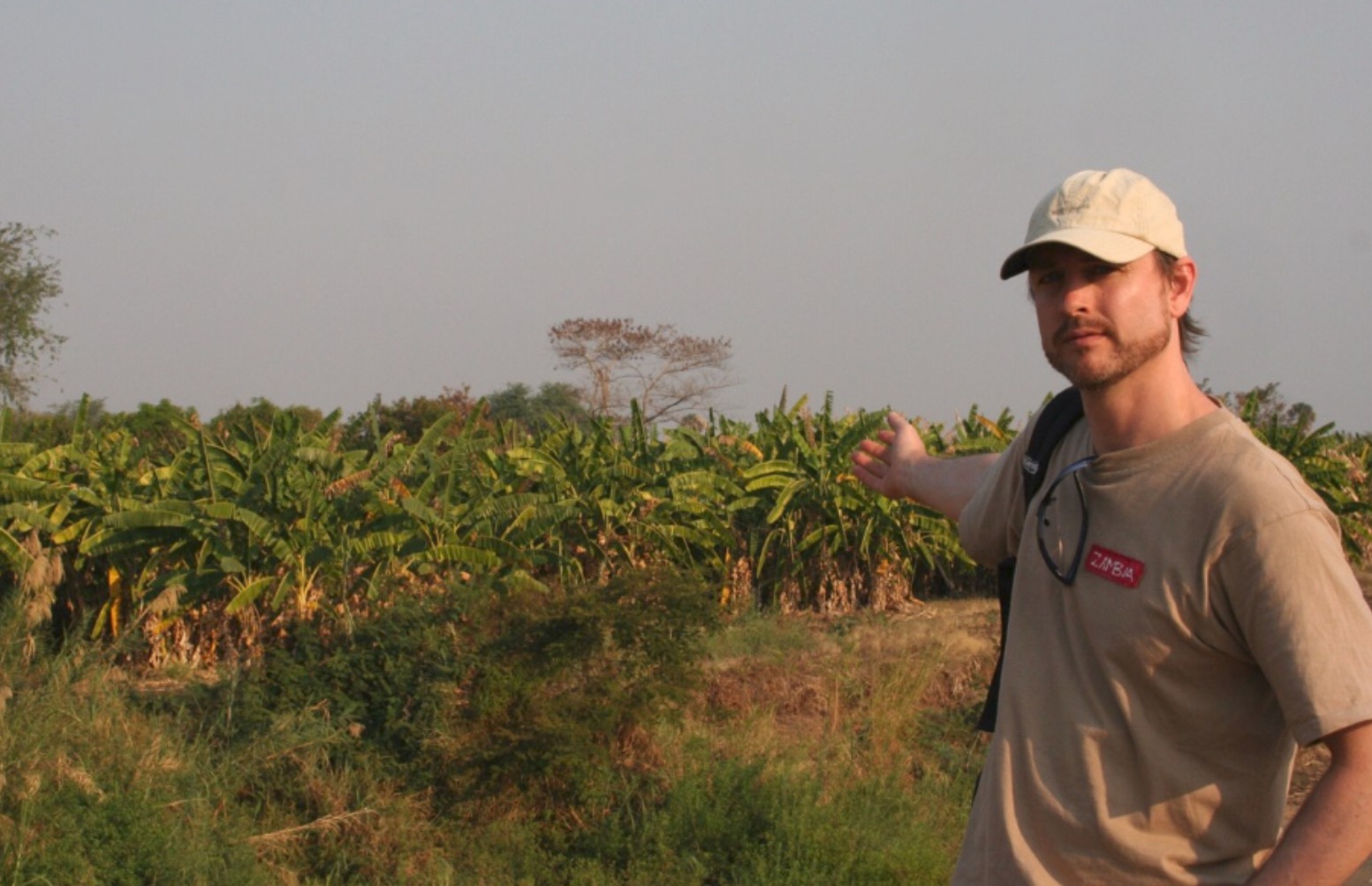
Organic banana fields
“Enfuwe village has banana fields, and it’s organic. In Zambia, we may be able to make banana paper sustainably.” With this in mind, I visited a banana field near a national park. When I told the owner of the field that paper can be made from bananas, the owner was very surprised. Bananas, which were previously only for eating, will create new jobs for banana farm owners, the women of One Planet Café, and the villagers. It also helps solve poverty problems and protect wildlife, and there are many advantages. Moreover, it is an eco-business that leads to “fun”, which is the policy of One Planet Café.
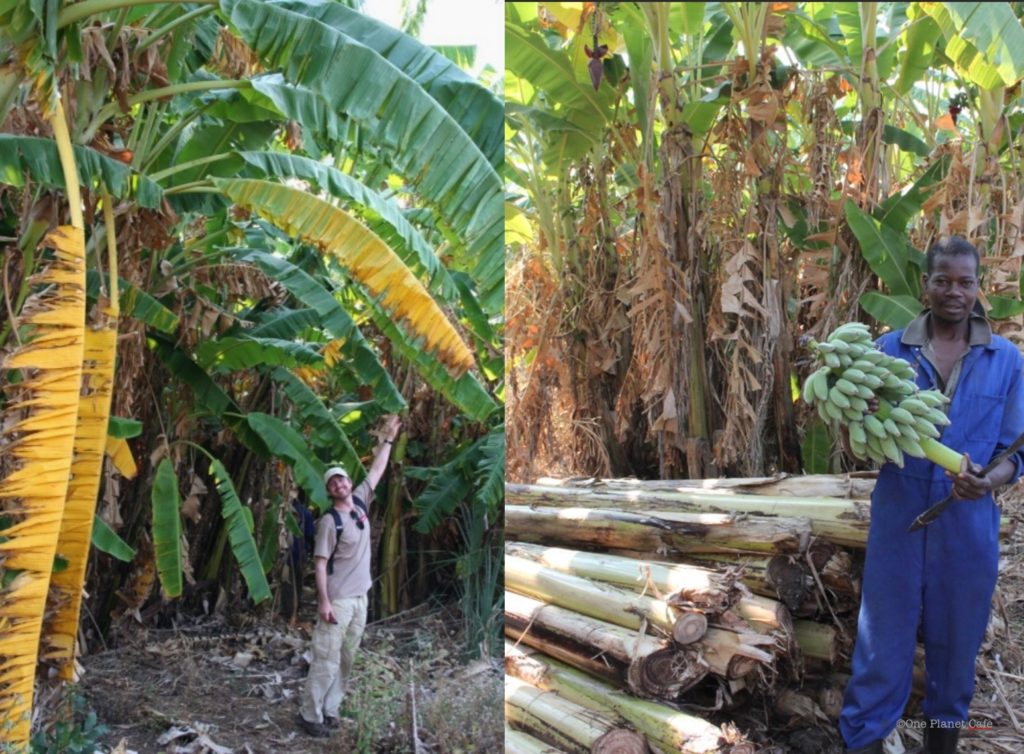
Banana fields and farmers in Zambia At first, I had no knowledge of how to extract fiber or how much can be extracted from a single stem, but I decided to work with the villagers who were excited about it. Japan after returning to Japan, I consulted with President Abe of Maruyoshi Nisshindo Printing Co., Ltd., who had already made business cards from banana paper, and he replied positively, “Let’s do it!” In 2011, we started a banana paper business. Everything was handmade tools, started by hand.
Team Banana Team and Green Factory (2014)
In 2014, thanks to the support of many Japan (crowdfunding), we started the construction of a sustainable banana paper factory (Zambia). It is a Green Factory tailored to environmental circulation. It’s where circular economy, renewable energy, bioclimatic design and more have been implemented! Currently, the banana paper factory has about 20 team members and two dogs. We call ourselves the “banana team,” not the “staff.” Members live in Enhue Village, near South Luangwa National Park in Zambia. Many have never been employed. There are many members who do not have basic education, and learning in the course of work and education through training is a very important opportunity. 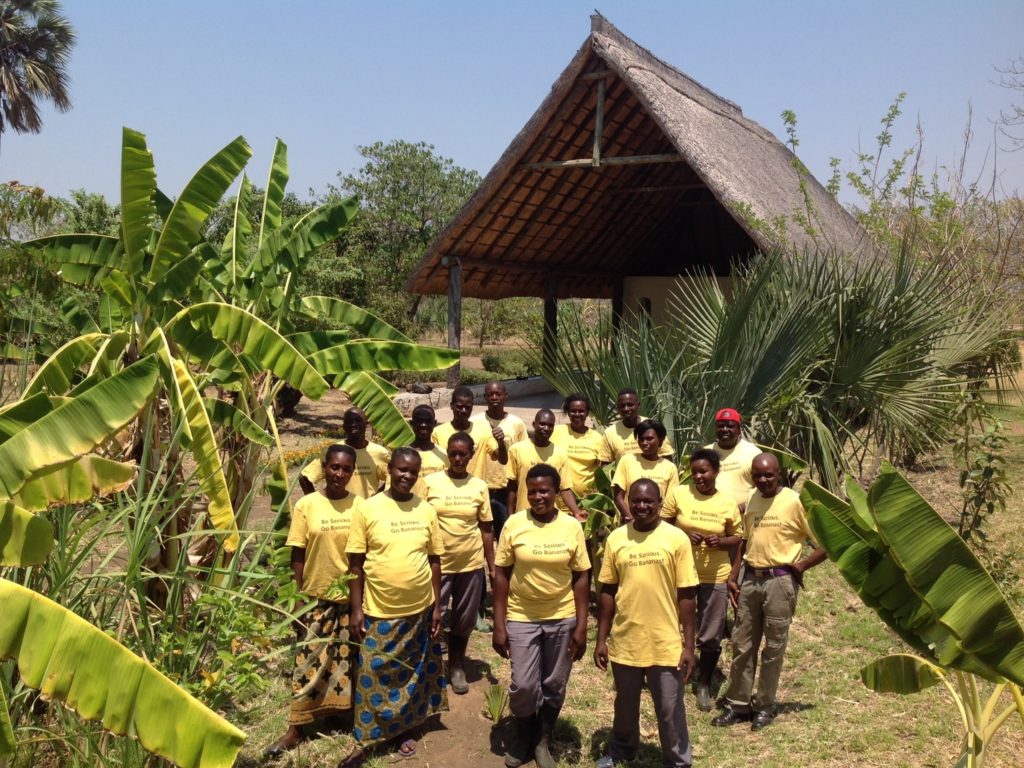 Banana team in Zambia at green factory
Banana team in Zambia at green factory
Fair Paper Fair Trade Certification (2016)
In 2016, we became the first paper industry to obtain the Japan Fairtrade certification (WFTO World Fair Trade Organization). One Planet Paper©︎ is the first Fairtrade certified paper in Japan. WFTO is a third-party certification label given to organizations that have cleared 10 social, environmental and governance guidelines and about 100 standards, which are all pillars of sustainability. Indicates that environmental considerations such as appropriate working conditions, fair wages and payments, prohibition of child labor, organic and green electricity, etc. are in place. External judges visited our Tokyo office, local Zambian factory, and banana fields to evaluate them. 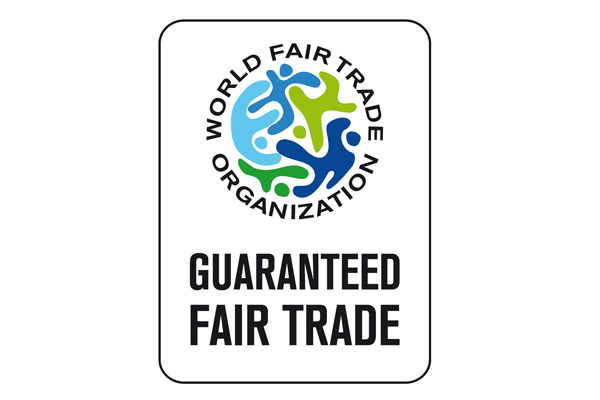
Examples of Fair Trade Initiatives
- People in the villages involved earn a fair income to overcome poverty
- Prohibition of child labor and support for children to go to school instead of work
- Implementation of local environmental and health education
- Pay equal compensation for equal work between men and women
- Employment does not discriminate in any aspect such as race, social class, nationality, religion, etc. *1
- We trade with consideration for producers to live socially, economically, and environmentally sound lives, and do not prioritize profits alone.
- Actively introduce environmentally recyclable energy, recycling, CO2 reduction, wildlife conservation, and organic initiatives*2
- A portion of the sales of the products (paper) sold will be returned to the village to support projects for sustainable development*3
*1 One Planet Cafe’s team is diverse: Almost half are women, diverse religions (Buddhist/Christian/Islamic), and age groups. *2 One Planet Cafe has established clear policies for the use of green electricity (wind and hydropower), waste and CO2 reduction, and integrates environmental recycling initiatives into its entire business. *3 One Planet Cafe also offers classrooms for adults who have never graduated from elementary school in Zambia.
From “Made in Japan” to “Made WITH Japan”!
oneplanet paper® is a fusion of Zambian banana fiber and Japan washi technology. In addition, collaboration with paper product manufacturers has created high-quality banana paper products. Japan has a wonderful manufacturing spirit based on harmony with nature and consideration for the environment, people, and culture. We believe that Banana Paper and Made with Japan can contribute to the creation of a sustainable society.
Washi Paper Echizen Washi
Banana paper is produced at the Echizen Washi factory in Fukui. Echizen Washi is an area with a history of 1500 years of paper making. The spirit of paper making in harmony with nature, which has been passed down and cherished since ancient times, is also utilized in banana paper. 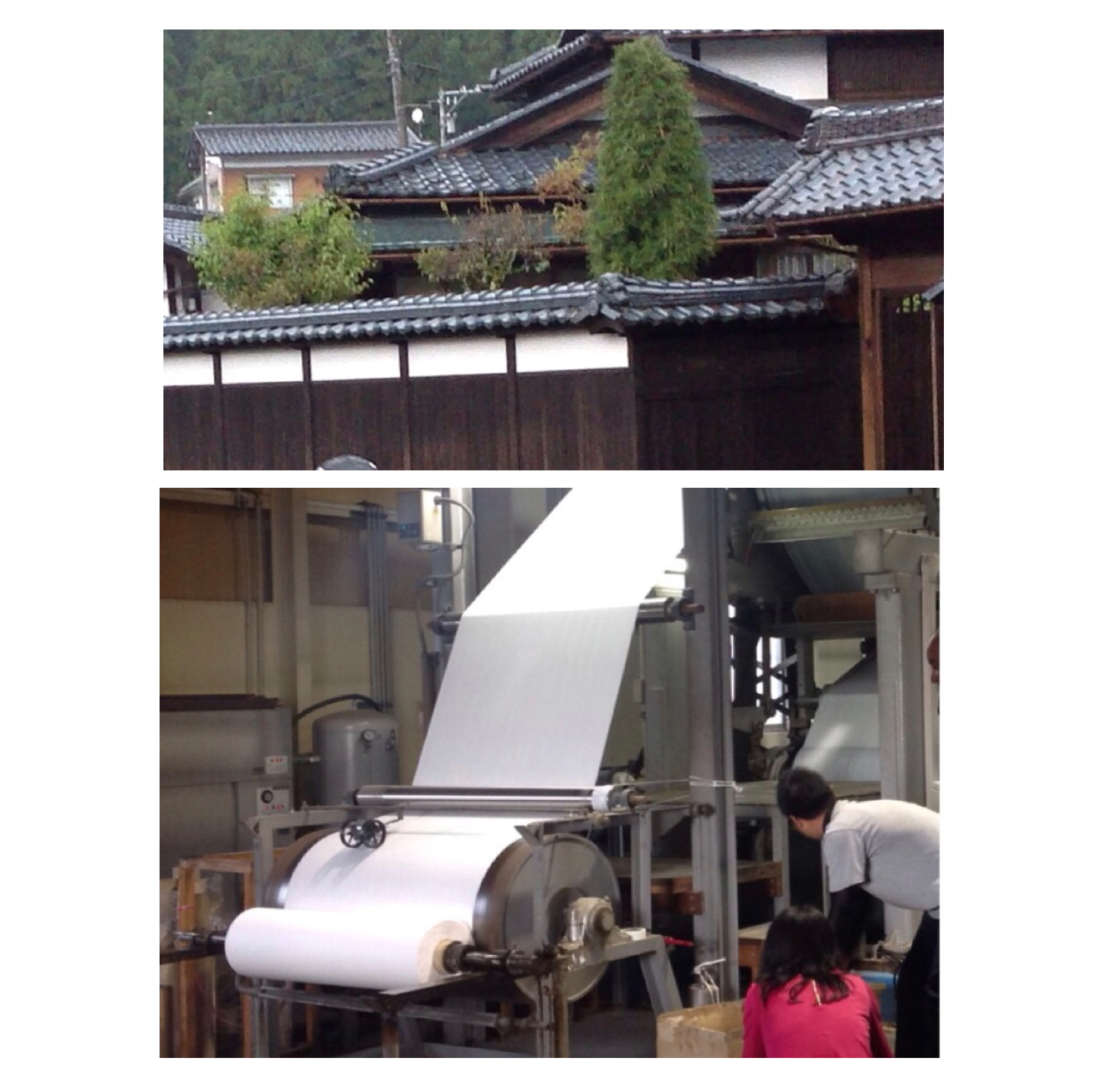 Photo: Paper factory in Echizen
Photo: Paper factory in Echizen
Committee One Planet Paper®︎Council
In 2013, in support of the purpose of One Planet Paper, we launched the One Planet Paper® Council together with paper product manufacturers and printing companies that share our thoughts.® As of June 2020, 21 companies are participating in activities such as product development using banana paper, sales cooperation, and awareness of sustainability. 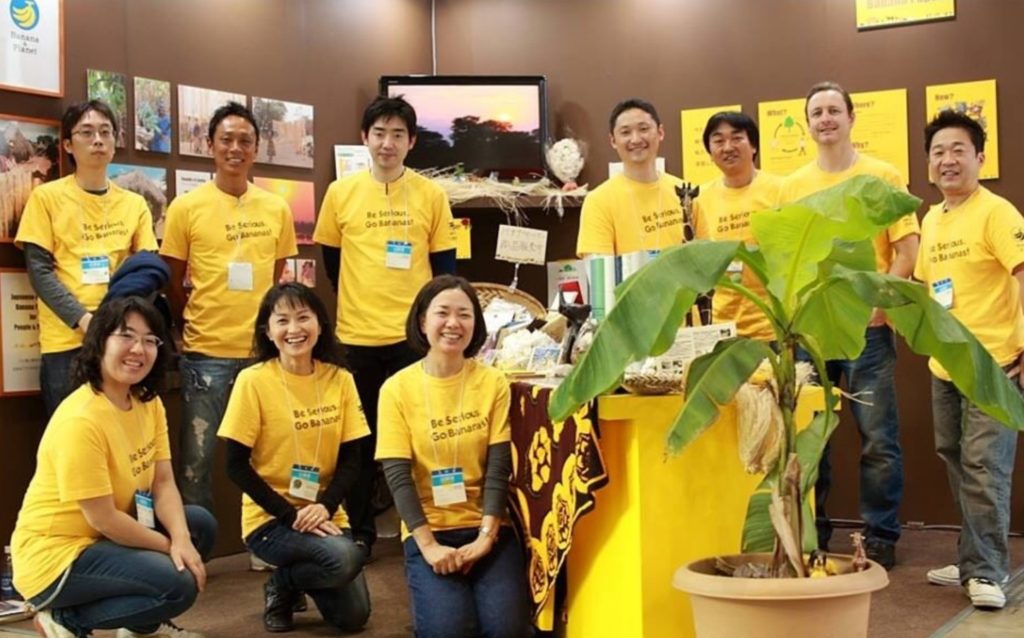 One Planet Paper©︎Council Banana paper products include business cards, stickers, tapes, diplomas, tubes, cards, paper crafts, wrapping paper, calendars, etc. We also offer whole chrysanthemums and rolls for business use. One Planet Paper®︎Click here for the product page>>
One Planet Paper©︎Council Banana paper products include business cards, stickers, tapes, diplomas, tubes, cards, paper crafts, wrapping paper, calendars, etc. We also offer whole chrysanthemums and rolls for business use. One Planet Paper®︎Click here for the product page>>
Factory Building a dream factory with crowdfunding
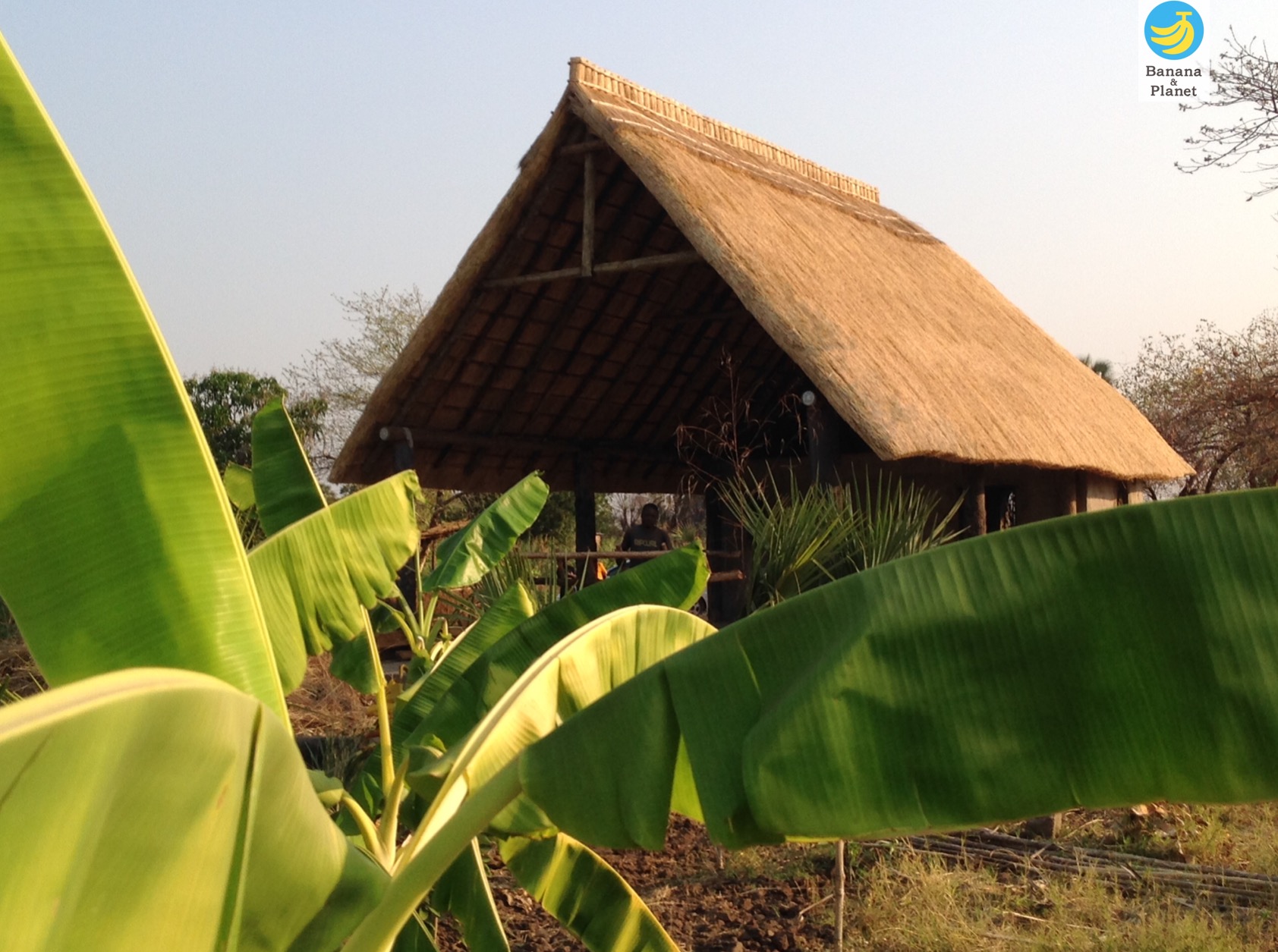 In order to realize our goal of “Banana Paper Factory in Africa!”, which was our goal since we started the business, we conducted the first round of fundraising through crowdfunding (READYFOR) on the Internet. In the two months from March to May 2014, 137 supporters reached the target amount of 125%. Thanks to the warm support of our supporters, we were able to take the first step in the construction of the factory. We have also received support from companies and foundations (Japan Embassy, Sawakami Foundation, Choice Hotels Japan Co., Ltd., Greens Co., Ltd., 1% For The Planet, Miyazawa Co., Ltd., Maruyoshi Nichishindo Printing Co., Ltd., Hokkaido Nomad Rent-A-Car). In September 2014, the construction of the banana paper factory started. Just like when we started picking banana fibers locally in 2011, we are finally ready to move towards a big adventure and dream!
In order to realize our goal of “Banana Paper Factory in Africa!”, which was our goal since we started the business, we conducted the first round of fundraising through crowdfunding (READYFOR) on the Internet. In the two months from March to May 2014, 137 supporters reached the target amount of 125%. Thanks to the warm support of our supporters, we were able to take the first step in the construction of the factory. We have also received support from companies and foundations (Japan Embassy, Sawakami Foundation, Choice Hotels Japan Co., Ltd., Greens Co., Ltd., 1% For The Planet, Miyazawa Co., Ltd., Maruyoshi Nichishindo Printing Co., Ltd., Hokkaido Nomad Rent-A-Car). In September 2014, the construction of the banana paper factory started. Just like when we started picking banana fibers locally in 2011, we are finally ready to move towards a big adventure and dream!
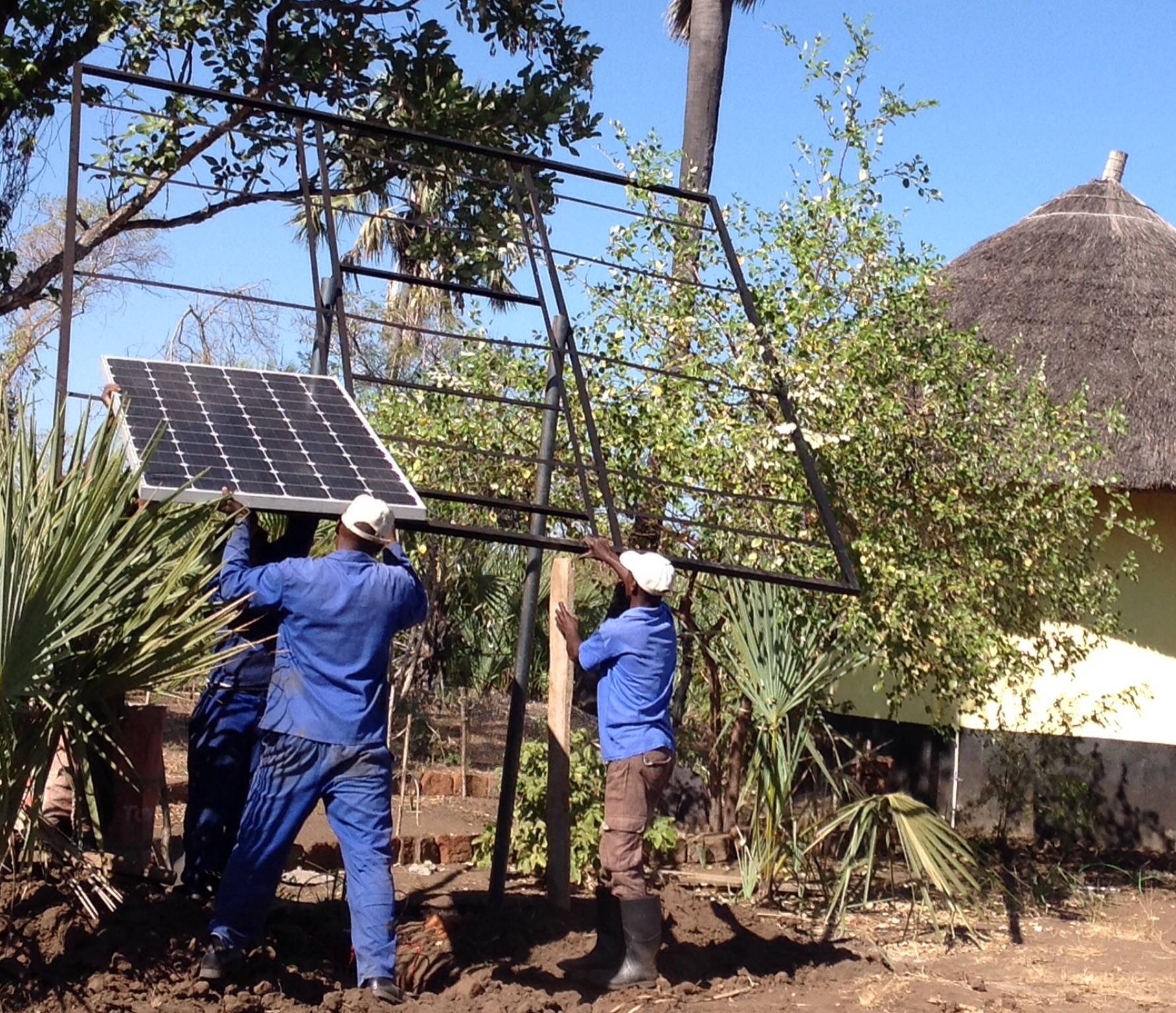
installing solar panels In a world without blueprints, electricity, or water, there are many things that are unthinkable in developed countries. The banana paper factory was built together with the carpenters in the village. Every day was a continuous challenge to find a construction manager, site supervisor, carpenter, plaster, etc. from a village where there were many people who had never even been to an elementary school, and proceed with construction based on the design and schedule. We implemented environmental and sustainability initiatives from the start. We have realized environmentally recyclable building materials, environmentally licensed wood and sand (it is not uncommon to use illegal building materials in Africa…), bioclimatic design (adapted to wind and sun), renewable energy, etc. Since the end of 2015, we have been implementing initiatives for all 17 goals in line with the SDGs.
Handmade Paper Making Handmade Paper
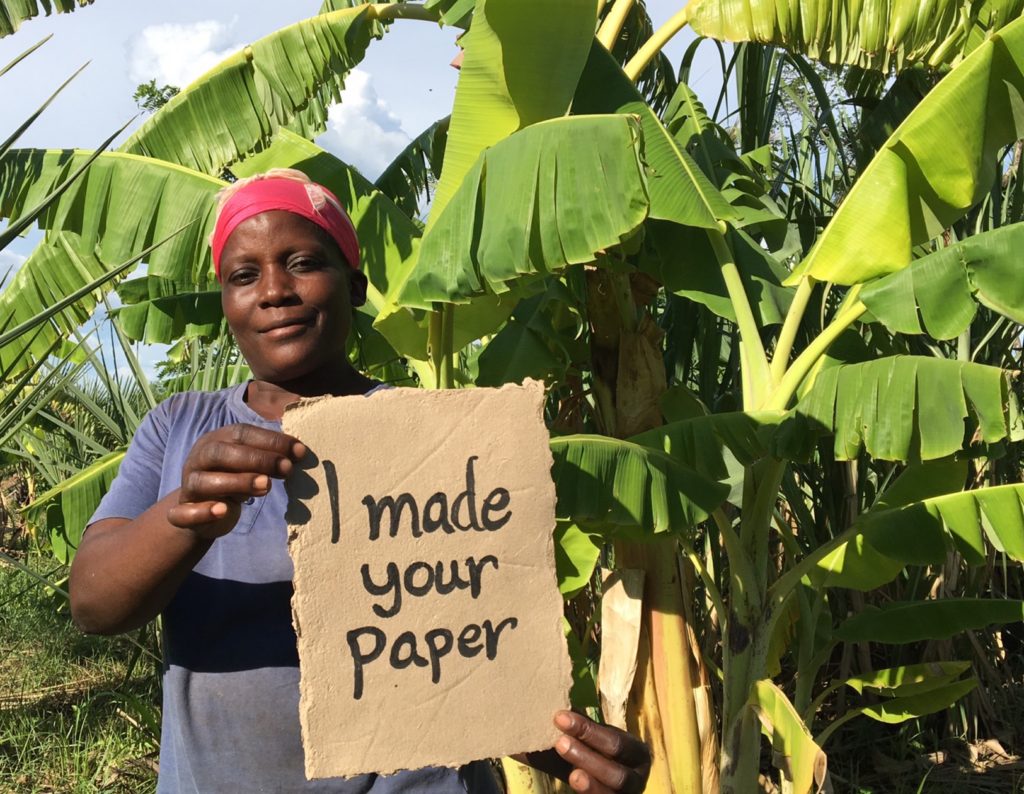 With the green factory realized, our next goal was to start not only banana fiber harvesting but also handmade paper in Zambia. Textile harvesting creates jobs for the people of the village and brings many benefits such as learning through work. On the other hand, our team’s willingness to work and improve their skills pushed us to take the next step.
With the green factory realized, our next goal was to start not only banana fiber harvesting but also handmade paper in Zambia. Textile harvesting creates jobs for the people of the village and brings many benefits such as learning through work. On the other hand, our team’s willingness to work and improve their skills pushed us to take the next step.

Learning from Japan’s washi technology Support from the Embassy of Japan Embassy Japan (2016-2017) In 2016, with support from the Embassy of Japan Zambia, we were able to expand the factory, set up a training room, and install equipment for hand-made banana paper.
[caption id="attachment_1473" align="alignnone" width="532"]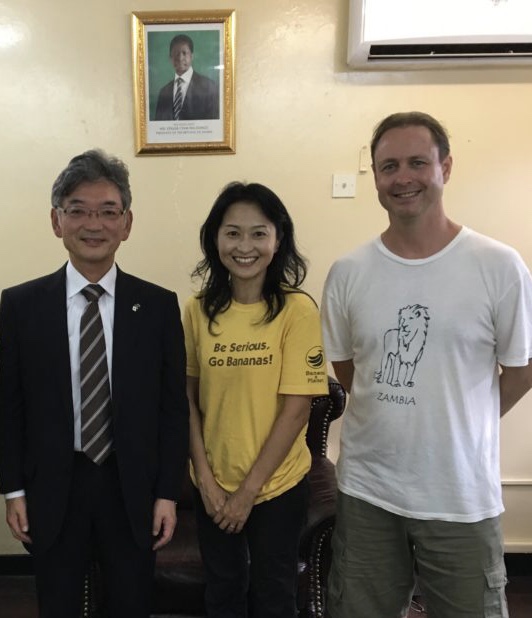 After the handover ceremony, I was able to receive first-hand training on paper making with the president of the Echizen Washi Factory, a banana partner, with the Embassy of Zambi Japan a and Ambassador Kojima
After the handover ceremony, I was able to receive first-hand training on paper making with the president of the Echizen Washi Factory, a banana partner, with the Embassy of Zambi Japan a and Ambassador KojimaIn the spring of 2017, the president of Echizen Washi Factory, a banana partner, came to Zambia and received first-hand training on paper making. For the first time in their lives, the faces of the team members who are learning to make paper are also serious.
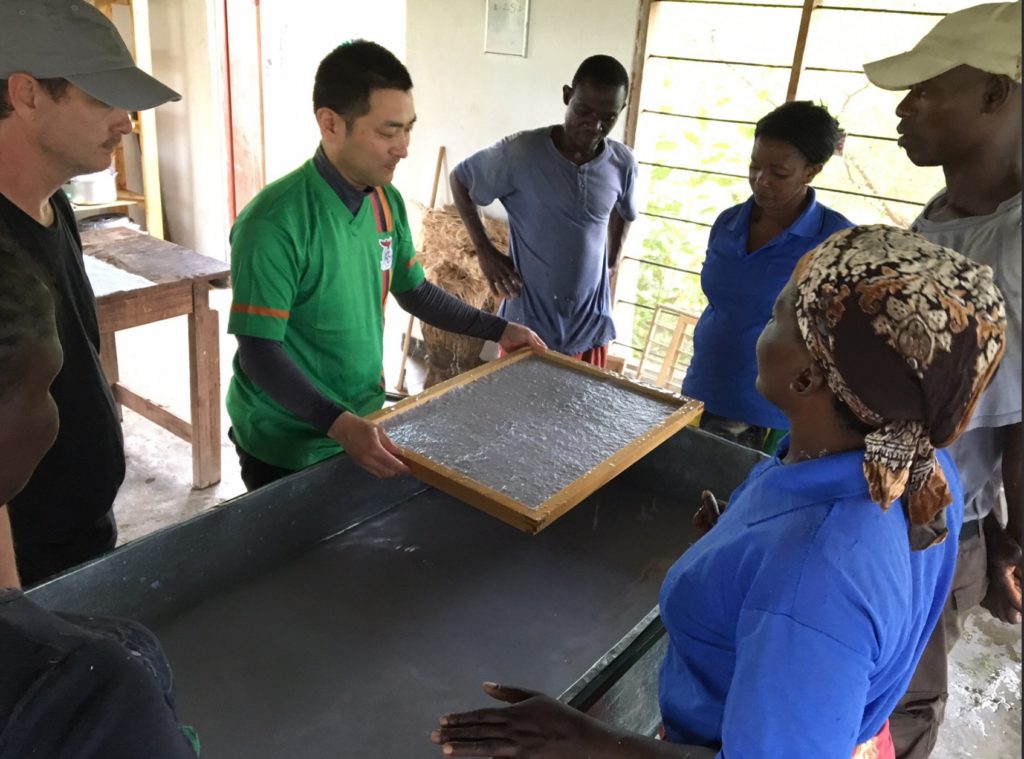
Paper making training by washi experts
The green factory in Zambia, which took its first step through crowdfunding, has five buildings, including a multipurpose room and an office, thanks to donations from the Japan Embassy, the Sawakami Foundation, and 1% For The Planet. We will now be able to make banana fiber and handmade paper, and we will aim to further improve the skills of local people and create employment.
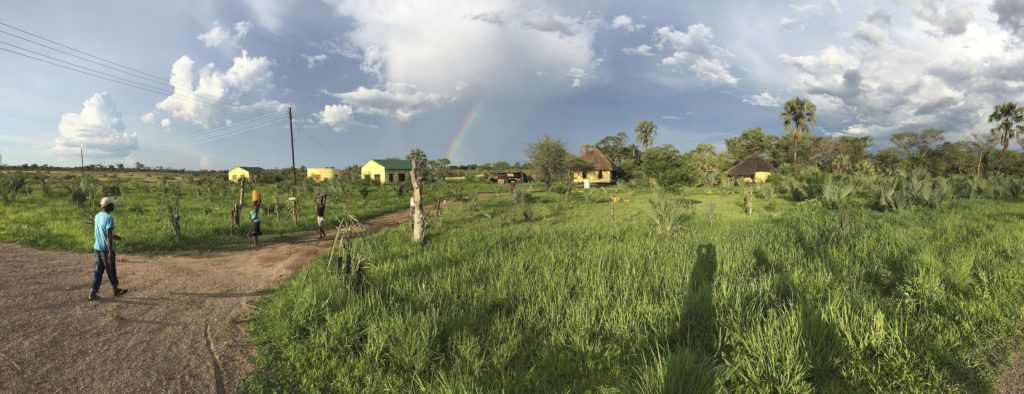
Zambia Green Plant with five buildings including multipurpose rooms and offices
Global Brand? Global Brands (2020)
The amount of paper used worldwide is more than 1 million tons every day *1. About 90% of them are mainly made from wood. With the economic development of the world, as the consumption of paper increases, the regeneration of trees cannot keep up, and forests are disappearing. At the same time, poverty problems in developing countries and unemployment problems in developed countries continue. Bananas, on the other hand, are grown in about 125 countries around the world. One Planet Paper® makes high-quality paper by adding stem fibers that are usually discarded in organic banana fields in Zambia and waste paper from Japan washi factories. This exciting new paper will not only solve poverty in developing countries, but also lead to the passing on of traditional techniques and the development of new markets in Japan. We also started a collaboration with a paper factory in the UK. In 2020, our Fairtrade banana paper was sold in 11 countries around the world. 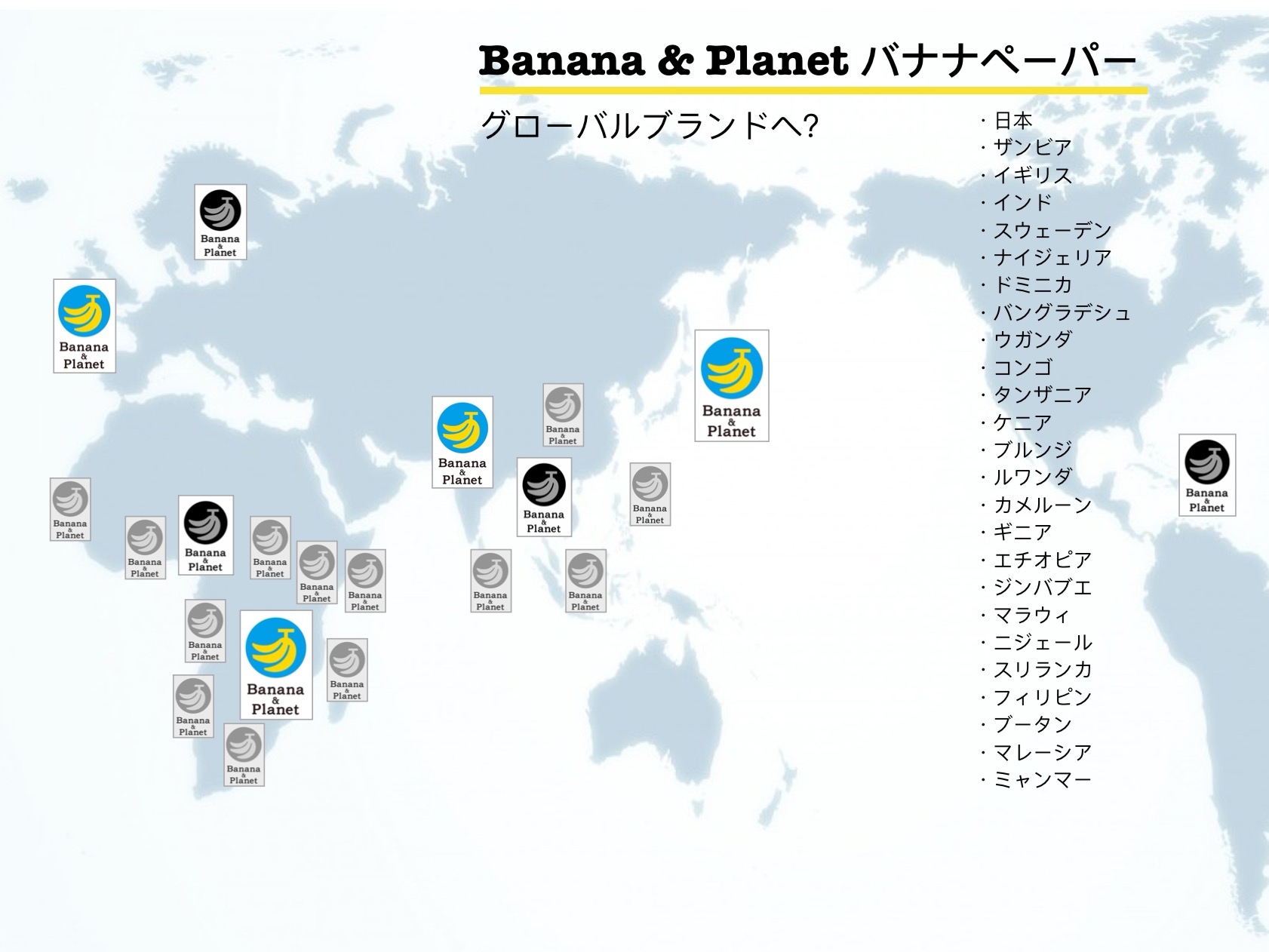 Inquiries and consultations about One Planet Paper® from all over the world are increasing So far, we have received inquiries from about 25 countries on four continents asking if they would like to make banana paper in their own countries and can help them. Every country is facing poverty and environmental problems and is looking for sustainable solutions. I would like to work toward becoming a global brand so that One Planet Paper® can be one of the solutions. *Source: WWF 2008-2010
Inquiries and consultations about One Planet Paper® from all over the world are increasing So far, we have received inquiries from about 25 countries on four continents asking if they would like to make banana paper in their own countries and can help them. Every country is facing poverty and environmental problems and is looking for sustainable solutions. I would like to work toward becoming a global brand so that One Planet Paper® can be one of the solutions. *Source: WWF 2008-2010

